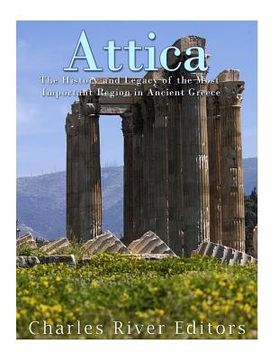Attica: The History and Legacy of the Most Important Region in Ancient Greece (en Inglés)
Reseña del libro "Attica: The History and Legacy of the Most Important Region in Ancient Greece (en Inglés)"
*Includes pictures *Includes ancient descriptions of Attica and Athens *Includes online resources and a bibliography for further reading According to Herodotus, the Persians offered the Athenians an alliance in 480 BCE. The other Greek city-states (polei) were understandably concerned that the Athenians, who had proved so crucial in defeating the Persians at Salamis, might take up the offer. The Athenians, however, responded, "If we were offered all the gold in the world or the most beautiful and fertile land imaginable, we would never be willing to join our common enemy and be party to the enslavement of Greece. First there is the burning and desecration of our temples and the images of our gods which compels us to extract from the perpetrators the greatest vengeance we can rather than come to terms with them. Then there is our Greek heritage, the bond of blood and language, our holy altars and sacrifices, and our common way of life, which it would ill become Athens to betray, as long as a single Athenian survives there will be no terms with Xerxes." In this statement, Athenian attitudes toward what it meant to be Greek are clearly and eloquently articulated. The core of being Greek lay in the fact that they shared a common outlook on life, rather than a common country. To an extent, that attitude has even prevailed into modern times; the 20th century Greek monarch, for example, held the title of "King of the Hellenes" rather than "King of Hellas." What, therefore, was the role - if any - of the land itself in shaping Greek (and particularly Athenian) attitudes toward themselves and their way of life? Did the land play any significant part at all in forming Greeks and Athenians? To answer these questions, it is essential to examine the impact of climate and landscape in the region known as Attica on the creation of Greek culture. The Greek world in the Classical period is not synonymous with modern day Greece but extended far more widely and included anywhere Greek was spoken, including southern Italy, Sicily, France, Spain, the eastern coast of modern day Turkey, and the settlements along the Black Sea and the Libyan coast. By the beginning of the 8th century BCE, Greeks were scattered throughout the Mediterranean and beyond. However, despite the fantastic tales and legends that came back to the homeland, most Greeks were constrained by the need to earn a living from their farms, the consequent daily calls on their time and - most importantly - the physical barriers imposed on them by the landscape in which they lived. It is in this context that any examination of the impact on Athens, or Attica, by its geography must be viewed. The Athenian polis was contiguous with Attica, a large triangular peninsula which pushed southeastward from the Greek mainland to the Aegean Sea. The city of Athens itself lay on a coastal plain surrounded by four mountains: Hymettos, Pentelikon, Parnes, and Aigaleos. In the 5th century, the city covered an area of approximately 2 square miles surrounding the Acropolis and was defended by a wall of approximately 4 miles in length. Athens is the best known of the ancient Greek cities and, as a result, Athens and Greece are often, yet incorrectly, seen as interchangeable terms. In many ways, Athens was exceptional in comparison with its fellow Greek city-states. The Athenians boasted of being autochthonous - that is, they claimed to be the original inhabitants of Attica and argued they had not come to the area from another region. This strong identification with the region of Attica, coupled with the actual physical geography of the area, was central to the way in which Athens developed, and it provides the underlying basis for any explanation as to why Athens became so exceptional in terms of its legacy and impact upon the world.

